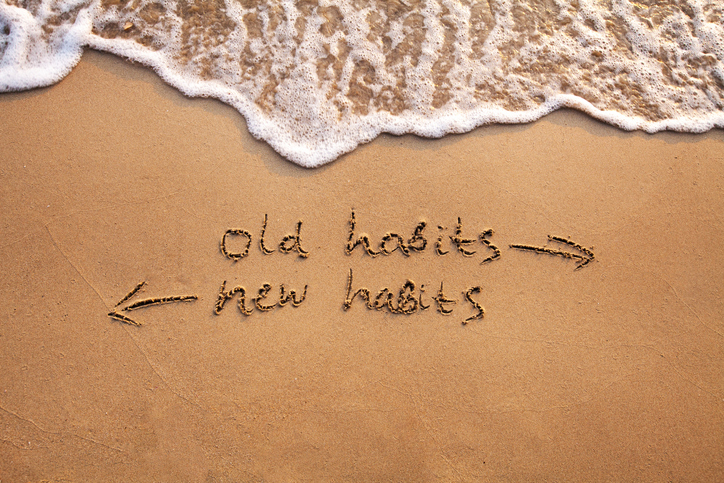Why is it so hard? You try to lose weight or quit smoking but can’t. You want to exercise but the gym is too far away, and home equipment is expensive. You want to be a better husband, wife, leader or servant but can’t find the time to volunteer, go to church or invest in yourself or your relationships. You want to pray, worship or study the Bible more but you’re too tired. We can easily justify why we don’t change; but the real issue may not be your problem. It might be you – specifically, your habits.
In 1756, Benjamin Franklin said, “old habits die hard.” Those words are as true today as they were then. We know that the lack of proper nutrition and exercise leads to obesity, yet, in 2021, 32% of American adults were obese. Today, cigarette smoking causes 1 in 5 deaths annually. Finally, we spend an average of 11 hours per day interacting with media (television, internet, gaming, etc.), more time than we work or sleep (www.cdc.gov). It is extremely likely that these, and other life problems, are actually rooted in our “habits.”
“A habit is something that you do often and regularly, sometimes without knowing that you are doing it” (Cambridge Dictionary). In most instances, we aren’t even aware that we are acting out our habits. As a former smoker, I can tell you I lit a cigarette after a meal without a second thought; it was an automatic response, just something I did.
What determines if a habit is good or bad? By themselves habits are neither good nor bad; this is determined by their outcomes. If a habit drives us toward or reinforces a goal, it is good. Conversely, habits are bad if they take us away from our achieving. It seems pretty simple, right? All we have to do is make the “right” decision and we’ll achieve our goals. But Romans 7:17-20 (MSG) reminds us of this faulty belief:
“But I need something more! For if I know the law but still can’t keep it, and if the power of sin within me keeps sabotaging my best intentions, I obviously need help! I realize that I don’t have what it takes. I can will it, but I can’t do it. I decide to do good, but I don’t really do it; I decide not to do bad, but then I do it anyway. My decisions, such as they are, don’t result in actions. Something has gone wrong deep within me and gets the better of me every time.”
The truth is that, even when we know what we should do, we don’t. We are conditioned, “hard-wired,” to seek instant gratification. Author Christine Carter explains:
“When our brain identifies a possible reward, it releases a powerful neurotransmitter called dopamine. That dopamine rush propels us toward the reward. Dopamine creates a very real desire for the carrot dangled in front of us. Unfortunately, our brain doesn’t distinguish between rewards that actually will make us happier and the things that won’t. Dopamine just motivates us to chase them all.”
If it is true that old habits die hard, it is equally true that new habits die fast. Shahram Heshmat Ph.D., explains that our daily decisions are driven by two systems. Citing Nobel laureate Daniel Kaheman, Heshmat describes the deliberative system as “effortful, guided by rational thinking, while the core of an impulsive system is made of learned habits. In the absence of self-control, habitual behavior is the default option.”
At Lead Like Jesus, we recognize that a permanent and everlasting change can only be happen by aligning our heart, head, hands and habits with God’s will and desire for us. He has a plan and purpose for us (Jeremiah 29:11) but it begins with surrender. If you “think” that the act of surrender is a passive act; you’re mistaken. Our surrender is the beginning of a partnership, a covenant. When we surrender ourselves to God and follow Jesus’ example of servant leadership; we agree to obey, and He agrees to transform us. Romans 12: 1-2 (MSG) tell us:
“So here’s what I want you to do, God helping you: Take your everyday, ordinary life—your sleeping, eating, going-to-work, and walking-around life—and place it before God as an offering. Embracing what God does for you is the best thing you can do for him. Don’t become so well-adjusted to your culture that you fit into it without even thinking. Instead, fix your attention on God. You’ll be changed from the inside out. Readily recognize what he wants from you, and quickly respond to it. Unlike the culture around you, always dragging you down to its level of immaturity, God brings the best out of you, develops well-formed maturity in you.”
Challenge: Consider a change that you want to make, but, remember the words of Albert Einstein, who said:
“The world as we have created it is a process of our thinking.
It cannot be changed without changing our thinking.”
A word of caution, we tend to focus our change in one dimension, area or habit in our life; God’s change is multi-dimensional. He is not going to change just one part of us, He is going to change all of us (Heart-Head-Hands-Habit). Trust me, we won’t be “The Way We Were.”










